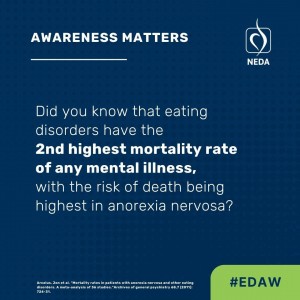 Eating disorders are complex illnesses that have serious effects on health and they can affect people of all genders, sexual orientations, racial and ethnic backgrounds, sizes, and shapes.
Eating disorders are complex illnesses that have serious effects on health and they can affect people of all genders, sexual orientations, racial and ethnic backgrounds, sizes, and shapes.
This week is Eating Disorders Awareness Week, an annual campaign to inform the public about the realities of eating disorders and to provide hope, support, and visibility to people and families affected by eating disorders.
About 9%, nearly 1 in 10 Arizonans, will have an eating disorder in their lifetime. Prevention, early screening, and treatment are important, and full recovery from an eating disorder is possible. The NEDA Screening Tool (for ages 13 and up) can help determine if it’s time to seek professional help.
There is no one cause of eating disorders, but some known behavioral and social factors where prevention efforts can be focused include frequent dieting, disordered eating behaviors, dissatisfaction with body weight or shape, and being bullied about weight or looks. Disordered eating behaviors, like meal skipping, fasting, purging, binge eating, and diet pill use have a negative impact on physical and mental health and decrease quality of life, with or without an eating disorder diagnosis.
According to the Arizona Youth Risk Behavior Survey, 1 in 2 Arizona teens who are trying to lose weight and 1 in 3 teens who are trying to stay the same weight report engaging in unhealthy weight control behaviors, like fasting and purging.
Our words matter. Families, friends, schools, communities, and health professionals can make efforts to prevent disordered eating. You can start by supporting positive relationships with food, exercise, and ways to improve body image.
We can all do our part to prevent eating disorders:
Public Health Professionals
- Learn about effective messaging strategies for health, nutrition and food, weight, and physical activity in The Language of Health Style Guide.
Parents, caregivers, and adults working with youth
- Explore WithAll’s Parent Guides and Power Pack for tips on how to talk with kids about food and their body to support lifelong health and well-being.
- Feeding young children? Read MyPlate’s Phrases that Help and Hinder to learn more about encouraging kids to learn healthy eating habits and honor their own hunger and fullness.
- Encourage and model a healthy and balanced relationship with food and movement to improve eating behaviors, health, and well-being.
- Avoid labeling foods and bodies as good or bad to lower the risk of unhappiness with one’s body and chronic dieting.
Friends
- Learn more about looks-based compliments and work to improve self-esteem by giving compliments on traits other than appearance (Compliments That Count).
Coaches
Learn how to support your athletes by joining the WithAll What to Say Coaches Challenge.









